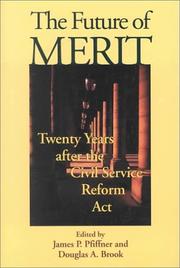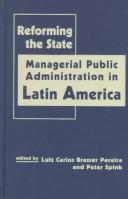| Listing 1 - 10 of 91 | << page >> |
Sort by
|
Book
ISBN: 9783525101445 3525101449 3647101443 3666101445 Year: 2017 Publisher: Göttingen: Vandenhoeck und Ruprecht,
Abstract | Keywords | Export | Availability | Bookmark
 Loading...
Loading...Choose an application
- Reference Manager
- EndNote
- RefWorks (Direct export to RefWorks)
Korruption ist bis heute ein moralisches Ubel. Verwaltungsreformen, genauer burokratische Reformen, gelten als Mittel, sich dieses Ubels nachhaltig zu entledigen. Diese Auffassung ist keineswegs neu. In Deutschland, wie auch anderswo in Europa, entstand sie Ende des 18. Jahrhunderts. Sie basierte auf einem neuen Verstandnis von Korruption, mit der zugleich neue Vorstellungen von Gemeinwohl und guter Verwaltung einhergingen. Dieses Buch handelt davon, wie sich das moderne Korruptionsverstandnis in der Publizistik herausbildete und schliesslich um 1800 als herrschendes Deutungsmuster etablierte. Letzteres richtete sich insbesondere gegen die Verwaltungsstrukturen des Ancien Regimes, darunter Sporteln, Patronage, Amterverkauf und -vererbung. Entsprechende Korruptionsvorwurfe dienten einer jungen Furstendienergeneration dazu, diese Strukturen als unmoralisch zu brandmarken und so vollstandig zu delegitimieren. Die Studie zeigt zugleich: Die Reformer Bayerns und Preussens nutzten das neue Korruptionsverstandnis, um ihre Verwaltungsreformen argumentativ zu begrunden und schliesslich umzusetzen. Doch bedeutete dies nicht in jedem Fall das Ende der uberkommenen Praktiken. Insbesondere Patronage blieb erhalten, anderte aber ihre Gestalt: Personale Verflechtung erfolgte fortan vermehrt uber akademische Netzwerke und andere Vergesellschaftungsformen, wie zuvor, uber Familie oder Geburtsstand. --
Corruption --- Civil service reform --- History.

ISBN: 0801864658 Year: 2000 Publisher: Washington, D.C. : Baltimore : Woodrow Wilson Center Press ; Johns Hopkins University Press,
Abstract | Keywords | Export | Availability | Bookmark
 Loading...
Loading...Choose an application
- Reference Manager
- EndNote
- RefWorks (Direct export to RefWorks)
Periodical
ISSN: 07566360 Publisher: Paris : La documentation française,
Abstract | Keywords | Export | Availability | Bookmark
 Loading...
Loading...Choose an application
- Reference Manager
- EndNote
- RefWorks (Direct export to RefWorks)
Civil service reform --- Civil service --- Fonction publique --- Réforme
Book
Year: 1968 Publisher: Urbana : University of Illinois Press,
Abstract | Keywords | Export | Availability | Bookmark
 Loading...
Loading...Choose an application
- Reference Manager
- EndNote
- RefWorks (Direct export to RefWorks)
Civil service reform --- United States --- Politics and government

ISBN: 9264065075 9264252797 9789264252790 Year: 1996 Publisher: Paris: OCDE,
Abstract | Keywords | Export | Availability | Bookmark
 Loading...
Loading...Choose an application
- Reference Manager
- EndNote
- RefWorks (Direct export to RefWorks)
Dans de nombreux pays de l'OCDE les réformes de la fonction publique accordent une attention croissante à la gestion des ressources humaines. Ces politiques et ces pratiques permettent aux cadres de la fonction publique de mieux structurer et guider les effectifs, afin de réaliser de nouveaux objectifs en matière d'organisation. Mais l'expérience montre qu'améliorer les politiques et les pratiques individuelles n'est qu'un aspect des réformes : le point capital est d'intégrer la gestion des ressources humaines aux activités opérationnelles de la fonction publique -- aux objectifs en terme d'impact et de résultat des différents ministères et organismes publics. Et de souligner ainsi qu'une gestion efficace des individus est indispensable à la réalisation de la mission de l'administration. En se fondant sur des enquêtes et des études de cas par pays, ce rapport identifie les facteurs qui ont conduit à réformer la gestion des ressources humaines dans les pays de l'OCDE. Il dégage de ce large évantail d'expériences des enseignements précieux pour les décideurs politiques et les praticiens. Il présente des stratégies de réformes prometteuses, permettant de s'assurer que l'évolution de la gestion des ressources humaines est bien conforme aux réformes plus larges de la gestion publique, destinées à rendre la fonction publique plus productive, davantage orientée vers les résultats et à l'écoute des citoyens.
Governance --- Civil service --- Civil service reform --- Fonction publique --- Personnel management --- Personnel --- Direction --- Réforme
Book
ISBN: 9970021206 Year: 1996 Publisher: Kampala : Fountain,
Abstract | Keywords | Export | Availability | Bookmark
 Loading...
Loading...Choose an application
- Reference Manager
- EndNote
- RefWorks (Direct export to RefWorks)
Civil service reform --- Merit system --- Spoils system --- Uganda --- Politics and government --- Patronage, Political
Book
ISBN: 0822955741 0585267111 Year: 1996 Publisher: Pittsburgh : University of Pittsburgh Press,
Abstract | Keywords | Export | Availability | Bookmark
 Loading...
Loading...Choose an application
- Reference Manager
- EndNote
- RefWorks (Direct export to RefWorks)
Civil service reform --- Civil service --- Government executives --- History. --- Personnel management. --- Merit system --- Spoils system --- Patronage, Political

ISBN: 155587374X 1685854192 Year: 1999 Publisher: Boulder Rienner
Abstract | Keywords | Export | Availability | Bookmark
 Loading...
Loading...Choose an application
- Reference Manager
- EndNote
- RefWorks (Direct export to RefWorks)
Administrative agencies --- Civil service reform --- Government productivity --- Organizational change --- Management --- Latin America --- Politics and government
Book
ISBN: 1282896652 9786612896651 9264086080 9264085890 9789264086081 Year: 2010 Publisher: Paris : OECD Publishing,
Abstract | Keywords | Export | Availability | Bookmark
 Loading...
Loading...Choose an application
- Reference Manager
- EndNote
- RefWorks (Direct export to RefWorks)
Finland’s traditional Nordic model is under pressure: A rapidly ageing society, the global economic crisis and growing societal disillusionment require the public administration to be strategically agile in order to maintain fiscal sustainability and to respond to a complex and rapidly changing environment. The government’s capacity to act in these difficult times will depend on the public administration’s ability to work together – across all of the public administration at the state and local level, and with society as a whole – in order to sustain success and maintain its global position in the future. This report is the second in a series of OECD country reviews that look at governance and public management issues from a comprehensive perspective. These reviews help countries to identify how reforms can better reinforce each other in support of overall government objectives. They also examine reform strategies that have worked in other countries and provide advice as to which reforms can be appropriately adapted to a given country.
Civil service -- Finland. --- Public administration -- Finland. --- Public administration --- Civil service reform --- Merit system --- Spoils system --- Patronage, Political --- Finland
Book
ISBN: 905328107X Year: 1996 Publisher: The Hague Ministry of Foreign Affairs
Abstract | Keywords | Export | Availability | Bookmark
 Loading...
Loading...Choose an application
- Reference Manager
- EndNote
- RefWorks (Direct export to RefWorks)
Public administration --- Public economics --- Sub-Saharan Africa --- Civil service reform --- Culturele antropologie en psychologie --- ontwikkelingssamenwerking --- ontwikkelingssamenwerking. --- Ontwikkelingssamenwerking. --- Merit system --- Spoils system --- Patronage, Political
| Listing 1 - 10 of 91 | << page >> |
Sort by
|

 Search
Search Feedback
Feedback About UniCat
About UniCat  Help
Help News
News